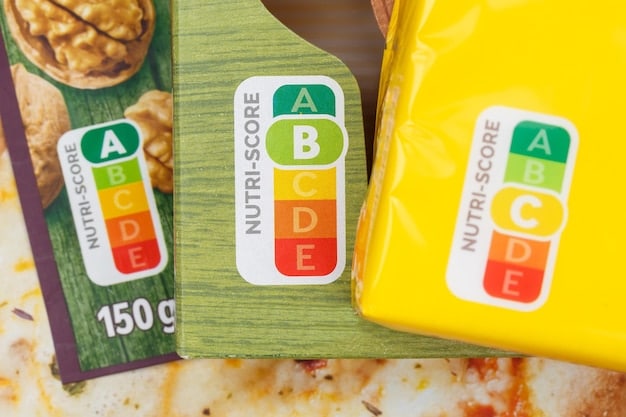The Impact of Processed Foods: A Health Analysis of Additives and Preservatives

The Impact of Processed Foods: A Scientific Analysis of Additives, Preservatives, and Their Effects on Health reveals the potential negative consequences of these foods due to ingredients like high fructose corn syrup, artificial sweeteners, and trans fats, contributing to risks such as obesity, cardiovascular diseases, and type 2 diabetes.
Are you concerned about the hidden ingredients in your everyday meals? Understanding the impact of processed foods: A scientific analysis of additives, preservatives, and their effects on health is crucial for making informed dietary choices that protect your well-being.
What are Processed Foods? A Comprehensive Overview
Processed foods are not a modern invention, but the extent of processing and our reliance on them has significantly increased. Knowing what constitutes a processed food is the first step in understanding its impact on our health.
At its core, food processing involves altering the natural state of foods for preservation, convenience, or flavor enhancement. This can range from simple actions like freezing and canning to more complex industrial processes. The level of processing varies widely among products.
Levels of Food Processing
Food processing exists on a spectrum, with some methods being relatively benign while others introduce potentially harmful elements.
- Minimally Processed Foods: These include fruits, vegetables, and nuts that have been washed, packaged, or slightly altered without adding artificial ingredients.
- Processed Culinary Ingredients: These items, like oils, sugars, and salts, are derived from whole foods and used in home cooking to prepare meals.
- Processed Foods: These products have undergone some form of processing, such as canning, baking, or drying, and may contain added salt, sugar, or preservatives.
- Ultra-Processed Foods: This category encompasses products that have undergone extensive industrial processing and contain many added ingredients, such as preservatives, sweeteners, and artificial colors. These are often ready-to-eat meals, sugary drinks, and snack foods.
Understanding the degree to which our food is processed can empower us to make better decisions about what we eat and how it affects our health. It’s also crucial to distinguish between processing that makes food safer or more accessible and processing that prioritizes profit over nutritional value.
Common Additives in Processed Foods and Their Purposes
Additives play a significant role in the appeal and longevity of processed foods. Comprehending their purposes and potential effects is another essential step in assessing the overall impact of processed foods.
Food additives are substances added to processed foods to enhance their taste, texture, appearance, or shelf life. While some additives are derived from natural sources, many are synthesized in laboratories.

Types of Additives
The range of food additives is vast, each serving a specific function in food processing.
- Preservatives: These substances inhibit the growth of bacteria, mold, or yeast, extending the shelf life of foods. Examples include sodium benzoate and potassium sorbate.
- Flavor Enhancers: These additives intensify the flavor of foods. Monosodium glutamate (MSG) is a common example.
- Colorings: Artificial colors are used to make processed foods more visually appealing. Examples include Red 40 and Yellow 5.
- Emulsifiers: Emulsifiers help to mix ingredients that would otherwise separate, such as oil and water. Lecithin is a common emulsifier.
The use of additives in processed foods is strictly regulated by governmental agencies to ensure safety. However, some studies suggest that certain additives may have adverse effects on health, particularly in sensitive individuals. Awareness of these additives can help consumers make more informed choices and reduce their intake of potentially harmful substances.
The Role of Preservatives and Their Impact on Shelf Life
Preservatives are crucial in extending the shelf life of processed foods, making them more convenient for consumers. However, their use also raises concerns about potential health effects.
Preservatives work by inhibiting the growth of microorganisms that cause spoilage. They also prevent chemical reactions that can degrade food quality. Some preservatives have been used for centuries, while others are relatively new.
Classes of Preservatives
Different types of preservatives serve distinct functions in preserving food.
- Natural Preservatives: These include salt, sugar, vinegar, and citric acid, which have been used for centuries to preserve foods through dehydration, fermentation, or acidification.
- Chemical Preservatives: These are synthetic compounds designed to inhibit microbial growth and prevent spoilage. Examples include sodium benzoate, potassium sorbate, and sulfites.
- Antioxidants: These preservatives prevent oxidation, which can cause fats to become rancid and fruits to brown. Common antioxidants include vitamin E and butylated hydroxyanisole (BHA).
While preservatives help maintain food safety and reduce waste, some individuals may experience adverse reactions to certain preservatives. Therefore, it is essential to read food labels carefully and be aware of potential sensitivities.

Health Effects of Processed Foods: Obesity and Metabolic Disorders
The high consumption of processed foods has been linked to a variety of health issues, particularly obesity and metabolic disorders. Understanding these links is crucial for promoting better health outcomes.
Processed foods are often high in calories, unhealthy fats, added sugars, and sodium, while being low in essential nutrients like fiber, vitamins, and minerals. This nutritional imbalance can contribute to weight gain and metabolic dysfunction.
Obesity and Processed Foods
The relationship between processed foods and obesity is complex, involving factors such as calorie density, portion size, and addictive ingredients.
Processed foods are engineered to be highly palatable and can override natural satiety signals, leading to overeating. The abundance of added sugars, fats, and salt in these foods can trigger reward pathways in the brain, making them addictive and difficult to resist.
Metabolic Disorders and Processed Foods
Consuming processed foods regularly can disrupt metabolic processes, increasing the risk of metabolic disorders such as type 2 diabetes, cardiovascular disease, and non-alcoholic fatty liver disease.
The high sugar content in processed foods can lead to insulin resistance, a hallmark of type 2 diabetes. Additionally, the unhealthy fats in these foods can raise LDL cholesterol levels and increase the risk of heart disease. Reducing the intake of processed foods and focusing on whole, unprocessed foods can help improve metabolic health.
Cardiovascular Risks Associated with Processed Food Consumption
The impact of processed foods extends beyond obesity and metabolic disorders, significantly affecting cardiovascular health. Understanding how these foods contribute to heart disease is vital for prevention.
Processed foods often contain trans fats, high levels of sodium, and added sugars, all of which can negatively impact cardiovascular health. These substances contribute to the development of atherosclerosis, hypertension, and other heart-related conditions.
Trans Fats and Heart Health
Trans fats are unsaturated fats that have been artificially hydrogenated to increase their shelf life and stability. These fats raise LDL (bad) cholesterol levels while lowering HDL (good) cholesterol levels, increasing the risk of heart disease.
Sodium and Blood Pressure
High sodium intake can lead to hypertension, a major risk factor for heart disease and stroke. Processed foods are a significant source of dietary sodium, often exceeding recommended daily limits in a single serving.
Limiting the consumption of processed foods and opting for fresh, whole foods can significantly reduce the risk of cardiovascular disease. Reading food labels carefully and being mindful of sodium, trans fats, and added sugars can help individuals make heart-healthy choices.
Strategies for Reducing Processed Food Intake in Your Diet
While processed foods are convenient and readily available, there are effective strategies for reducing their intake and improving overall dietary quality.
Making small, gradual changes to your eating habits can have a big impact on your health. Start by identifying the processed foods you consume most frequently and finding healthier alternatives.
Practical Tips for Reducing Processed Foods
Adopting simple habits can significantly decrease your reliance on processed foods.
- Read Food Labels Carefully: Pay attention to the ingredient list and nutritional information to identify added sugars, unhealthy fats, and sodium.
- Cook at Home More Often: Preparing meals at home allows you to control the ingredients and portion sizes, reducing the intake of processed additives.
- Choose Whole, Unprocessed Foods: Focus on fruits, vegetables, whole grains, and lean proteins as the foundation of your diet.
- Plan Your Meals: Planning meals in advance can help you avoid impulsive purchases of processed snacks and convenience foods.
By implementing these strategies, you can gradually reduce your intake of processed foods and improve your overall health and well-being. Remember, small changes over time can lead to significant improvements in your dietary habits.
| Key Point | Brief Description |
|---|---|
| ⚠️ Additives in Foods | Enhance flavor and shelf life, but some may have health impacts. |
| ⏱️ Preservatives | Extend shelf life by preventing spoilage, but may cause reactions. |
| ❤️ Cardiovascular Health | Processed foods can increase heart disease risks. |
| ✅ Reducing Intake | Choosing whole foods and reducing processed foods improves overall health. |
Frequently Asked Questions
▼
A processed food is any food that has been altered from its natural state, involving methods like canning, freezing, or adding additives for preservation or flavor.
▼
No, not all processed foods are detrimental. Minimally processed foods like pre-cut vegetables and canned beans offer convenience without significant nutritional loss.
▼
Be cautious of artificial sweeteners, trans fats, and high fructose corn syrup, as they are linked to various health issues. Always read the ingredient labels carefully.
▼
Start by reading labels, cooking more at home, and focusing on whole, unprocessed foods. Meal planning can also help you avoid impulsive processed food purchases.
▼
Long-term consumption can lead to increased risks of obesity, heart disease, type 2 diabetes, and other metabolic disorders. A balanced diet is key to avoiding these risks.
Conclusion
Understanding the intricacies of the impact of processed foods: A scientific analysis of additives, preservatives, and their effects on health is crucial for making informed dietary choices. By being mindful of the ingredients and processing methods used in our food supply, we can take proactive steps to protect our health and well-being.





